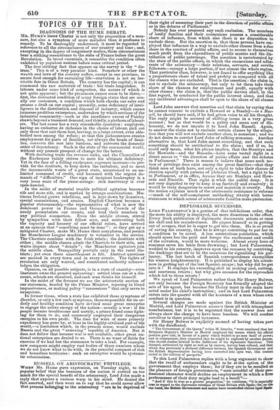TOPICS OF THE DAY.
DIAGNOSIS OF THE HUME DEBATE.
Mn. HUME'S lesser Charter is not only the proposition of a mea- sure, but also a symptom of more maladies than it professes to remedy. To be thoroughly understood, it must be regarded in reference to all the circumstances of our country and time ; and, excepting in the degree of sanguinary malice, those circumstances bear a striking resemblance to the state of France before the great Revolution. In broad essentials, it resembles the condition often exhibited by populous nations before some critical period. The first striking fact that appears on the survey is the "dis- tress." This is of a very peculiar kind. Somehow or other the wealth and laws of the country suffice, except in one province, to secure food enough for sustaining life—starvation is not an ine- vitable fate in Great Britain. The country has the capital ; it can command the raw materials of trade : but trade languishes. It labours under some kind of congestion, the nature of which is not quite apparent ; but the proximate causes seem to be three,— first, the distracted condition of many foreign states that are usu- ally our customers, a condition which both checks our sales and creates a draft on our capital ; secondly, some deficiency of intel- ligence in the distribution and disposal of industry, which causes immense profitless enterprises, undertaken by whole sections of the industrial community—such as the inordinate excess of Paisley shawls beyond a transient demand; and thirdly, a plethora of labour- ers. The last cause has a very remarkable operation : employers, having an embarras de richesses in the choice of labour, pick out only those that suit them best, leaving, to a large extent, even able- bodied men among the refuse; so that this picksomeness creates employment for parts of families, not always the heads of fami- lies, converts the rest into burdens, and subverts the domestic order of dependency. Such is the state of the commercial world, without any present prospect of change for the better. With declining trade the revenue sinks, and the Chancellor of the Exchequer vainly strives to mete his ultimate deficiency. Yet in the face of a falling exchequer, expenses increase—to pro- vide for the destitute, to keep down the turbulent, and to meet the innumerable wants of a great state, accustomed to an un- limited command of credit, and harassed with the urgent de- mands of "difficulties." One sign of incipient bankruptcy is a very loose state of the purse-strings : rich insolvency is ever open-handed.
In the midst of material trouble political agitation becomes rife and more rife, and is marked by strange combinations. Mu- tinous Ireland grows rebellious, and is kept down by donatives, special commissions, and armies. English Chartism becomes a popular statesmanship—the representative of what is now the dominant power in France and Germany. Crowds of the needy perambulate our streets, and lend their numbers to any political commotion. Even the middle classes, stirred by sympathies with their fellow men, and mistrusting both the capacity and honesty of our official rulers, have arrived at an opinion that "something must be done" : so they get up a mitigated Charter, make Mr. Hume their coryphseus, and permit the Manchester League machinery to volunteer in the service. The Chartists combine with the Irish rebels ; the destitute with either ; the middle classes admit the Chartists to their side, and waive dispute about "details"; the Manchester agitators join the middle class. Tranquillity prevails only in the rural dis- tricts; yet even there unsettlement is felt. Abstract questions are mooted in every town and in every coterie. The rights of revolution are only waived, and constituted authority acknow- ledges the obligation. Opinion, on all possible subjects, is in a state of anarchy—even literature owns the general upheaving : settled ideas are at a dis- count, schools are dissolved, and each man thinks for himself.
In the midst of the ferment we see the aristocratic section of our statesmen, headed by the Prime Minister, reposing in bland impassiveness, or making paltry " concessions " that only serve to exasperate. In former times, when a state has exhibited these symptoms of disorder, or only a few such symptoms, those responsible for its or- derly and healthy condition have devised some great enterprise to engage the active energy of the nation—usually a war : if his people became troublesome and unruly, a prince found some fight- ing for them to do, and commonly employed their dangerous energies to his own profit. The time for wars of mere princely expediency has gone by, at least in the highly-civilized part of the world,—a limitation which, in the present sense, would exclude Russia and the great "annexing" republic of America. But it does not follow that because war is not available, other great na- tional enterprises are denied to us. There is no want of fields for exercise if we had but the statesman to take a lead. For example, new conquests might employ vast bodies of those numbers whom we do not know what to do with, in the peaceful conquest of rich and boundless territories : such an enterprise would be systema- tic colonization.


























 Previous page
Previous page